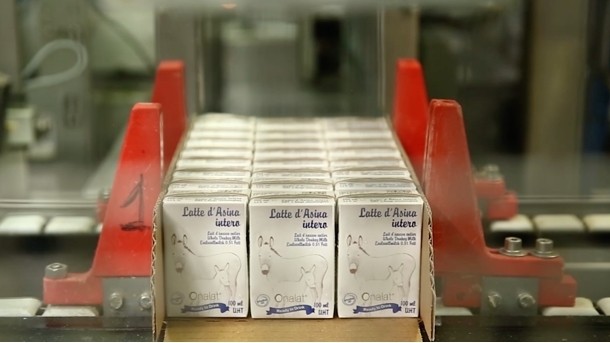New donkey milk products in pipeline

Pierluigi Christophe Orunesu, CEO of Eurolactis, told DairyReporter that increasing production to meet the demand for Onalat, the only Tetra Pak donkey milk in the world, was a challenge.
“We’re entering a very important cycle of production. We started with 20,000 bricks per batch, now we are going to reach the 40,000 bricks per batch produced,” Orunesu said.
“We’re seeing a steady increase in demand for Onalat in Europe, in the US, Asia and Australia. We are expanding our distribution network in Italy.
“We are providing to key players like Sojasun, who distribute our product in France, and have wholesalers in Austria, Italy, Switzerland and Germany. We have requests in the UK, but there it is online only right now.”
Donkey milk supply
Orunesu that obtaining donkey milk is another challenge.
Currently, Eurolactis takes milk from 1,000 donkeys, mostly in Italy.
“But there is big potential in the Balkans,” he said, adding that Portugal was another country that could supply milk.
Regional variation, according to Orunesu, would be minimal in terms of milk quality. He added, however, that if suppliers are following the nutritional guidelines, quality varies little.
He did note that there is a seasonal variation, and that milk quantity can be affected by location and feed differences.
Animal welfare is important, he added, because if the animal is not respected, the quality and quantity of the milk can be impacted.
Milk with benefits
Donkey milk is different to cow’s milk in many respects.
“Consumers want milk with true benefits,” Orunesu explained.
“And donkey milk proteins are very close to human breast milk. Donkeys have one stomach, as we do; this means the protein is not transformed as with ruminants.”
He also added that donkey milk is the only naturally hypo-allergenic milk, and has a good balance of omega-3 and omega 6.
As donkey milk can be consumed by those with allergies to milk, “Doctors in Italy and France are starting to recommend donkey milk as a substitute,” he said.
“What is important is the technology we are using, some UHT technology can impact on the final composition but, in our case, we preserve and keep more than 95% of the vitamins, minerals and there is no impact on the protein, so we keep the value of the milk.”
The milk is available in stores in Europe and also online, where three 100ml cartons cost €3.20 ($3.64).
Donkey chocolate
Later in 2016, Eurolactis will be launching a premium donkey milk chocolate bar with “a famous master chocolatier in Switzerland.” Orunesu says this is a large scale production of a non-bovine sweet chocolate that has naturally hypo-allergenic milk.
“It is a project that we have been working on for eight or nine months. It’s not the first in the world (for donkey milk chocolate), but it will be the first on a large scale.
“The taste is very sweet and light. Donkey milk has a sweet taste; it is three times less fat than cow milk, so it is a bit lighter than traditional chocolate. It is richer in omega 3, too.”
Future projects
Orunesu said that, initially, the company had to prove all of the health benefits of the product, and they started to promote on the medical aspect of the milk.
And it’s the medical benefits of donkey milk that are providing the direction for Orunesu’s next project.
“Now, we're working on a special product dedicated to premature babies, we’re currently doing a clinical study, and the results will be available in 2017.”
About donkey milk
Because of its similarity to human breast milk, donkey's milk is often given to children with allergies.
Protein levels (g/100g) are at the upper end of human milk levels. Donkey milk has between 1.5-1.8 g/100g, compared to 09.-1.7 for humans. Cow’s milk has more protein, at 3.1-3.8.
Fat levels are considerably lower for donkey milk, at 0.3-1.8g/100g, compared to 3.5-4.0 for humans and 3.5-3.9 for cows.
Donkey milk has a similar pH to human milk, 7.0-7.2, compared with human milk of 7.0-7.5. Cow’s milk, on the other hand, is slightly more acidic, at pH 6.6-6.8.
Lactose levels are also similar, with donkeys at 6.9% and humans 7.0%; cow’s milk is approximately 4.6% lactose.
Donkey milk also contains compounds that boost the immune system, such as lactoferrin, lactadherin and lysine.







